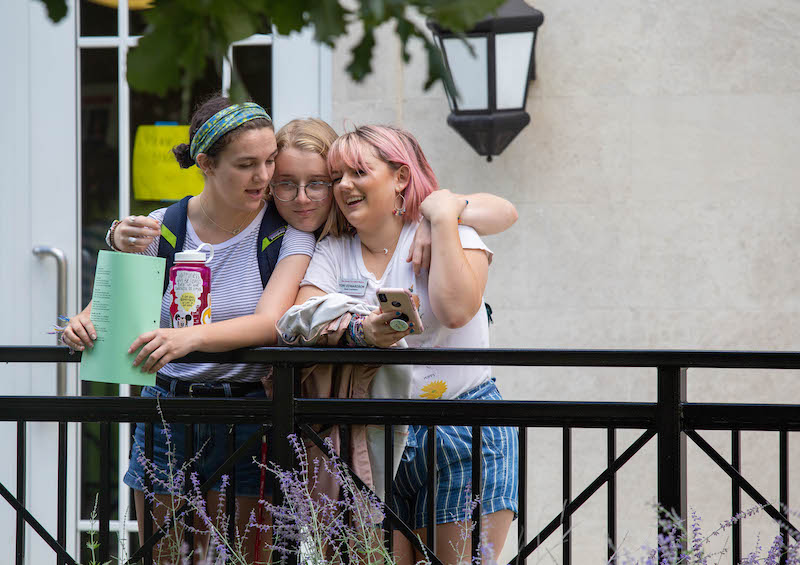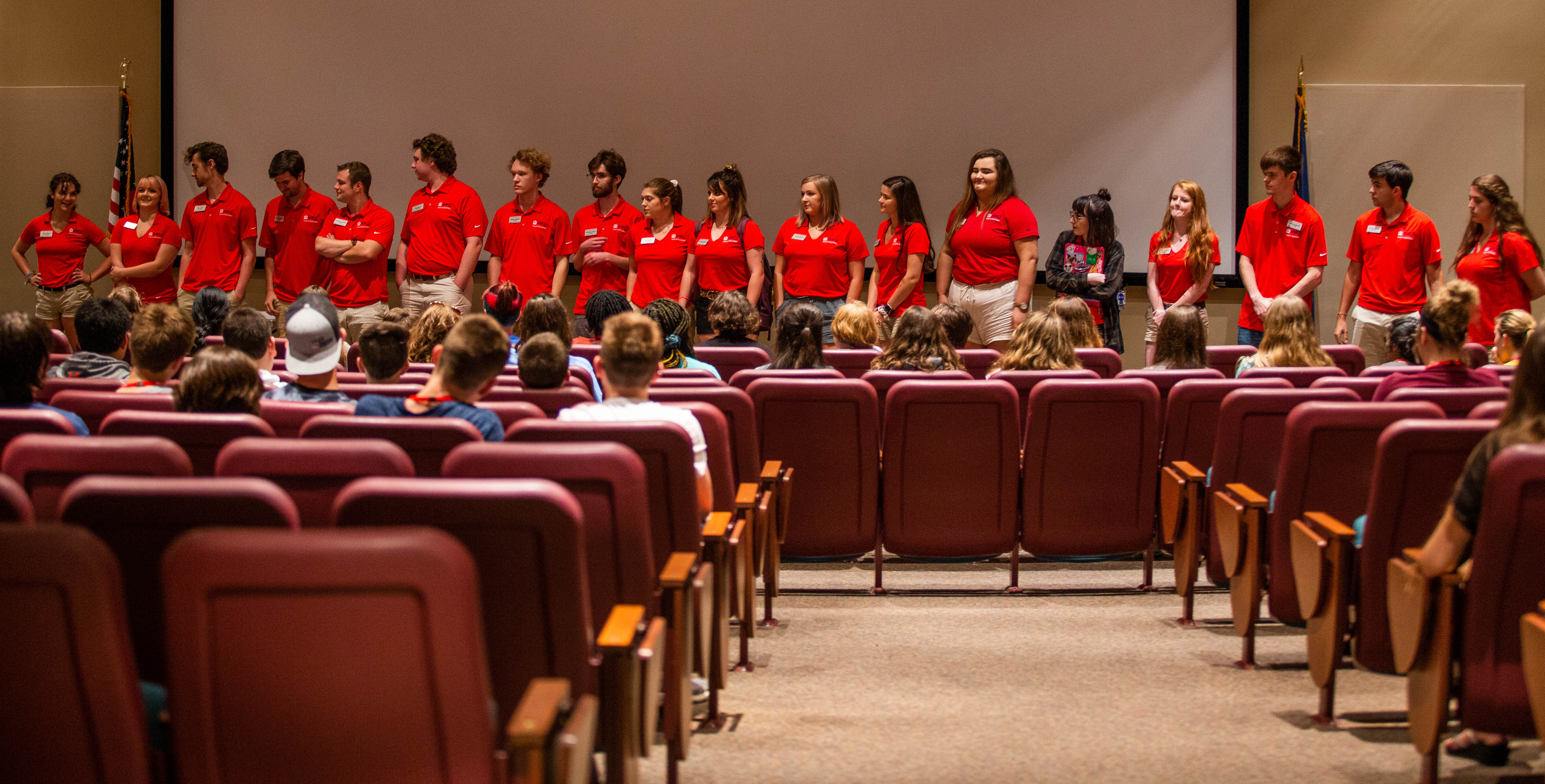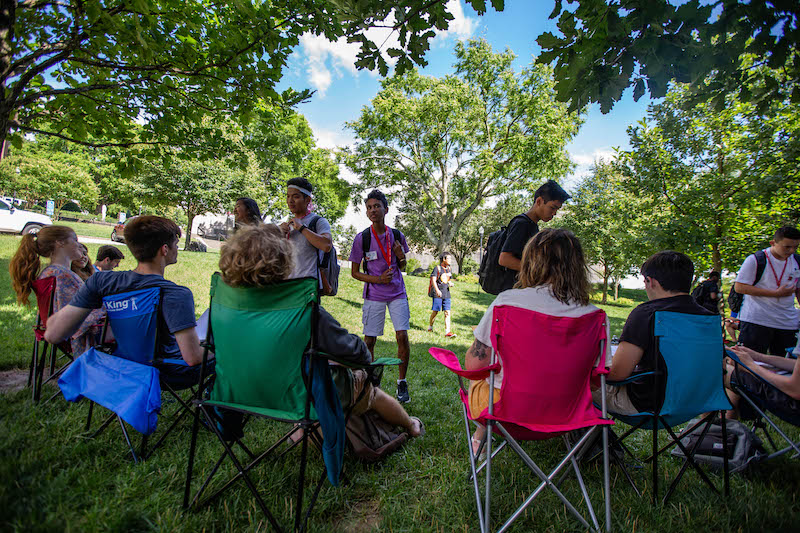by Erika Solberg

Every summer, VAMPY students grow as learners by focusing on one academic topic for three weeks. Our campers develop not only academically, however; they also grow socially and emotionally. VAMPY’s commitment to supporting the whole child is what makes it a unique and treasured experience for gifted young people.
Addressing gifted students’ social and emotional needs begins in the classroom, where the absence of grades creates a positive environment. Second-year camper Ari Srivastava explains, “You don’t have as much of a weight on your shoulders when you’re learning at VAMPY versus at school. You don’t have as much pressure to do it right the first time.” Cathleen Smalley, a third-year camper, agrees: “Not having grades really takes the pressure off. Your parents aren’t worrying about if you’re doing well in school or not. You don’t have to worry about your GPA or doing well on tests. You get to figure out what you’re interested in instead of just doing what you’re forced to do.”
The overall structure of VAMPY also facilitates close relationships. Ari says, “VAMPY is tight-knit because you’re in one class every day for three weeks, so you have a close relationship with those people. You also have three weeks to have a relationship with people in your hall.” Second-year camper Jai Mehta adds, “You get to talk with the friends you meet in your hallway and throughout the building. At meals, you can really talk with your friends.”
Additionally, because it focuses on gifted students, VAMPY creates at atmosphere that shifts campers’ sense of who they are and who they are allowed to be. Second-year camper Mica Mancini says, “Back home, I’m considered ‘the smart friend.’ When I come to VAMPY, everyone’s the smart friend, so I have to figure out my identity. I develop my artistic side more, and I’m more social because I know no one’s trying to be friends with me just because I’m smart and could do their homework.”
Jai’s experience is similar: “Socially, you definitely get out of your comfort zone. Like Christian Butterfield (VAMPY 2015-18, Travel) said in his speech at the banquet last year, at school I’m ‘the smart one,’ but at VAMPY, I have to find something that’s beyond that. I can be more of myself and be who I think I am. I’m more open here.”
As for Ari, he says, “At school, when you talk, you have to be conscious of not sounding too smart, sounding stuck up. Here, it doesn’t matter. Nobody cares, so you can act more like yourself — and everyone shares interests.”

Beyond these essential design elements of VAMPY lies another important reason that campers find social and emotional support: our counselors. Like any group of camp counselors, VAMPY’s counselors are young, enthusiastic, energetic, and organized. Unlike at other camps, however, VAMPY counselors possess a familiarity with what it is like to grow up gifted. Since almost all of them attended our camps themselves, they know what VAMPY can do for its campers and share the belief that it is a place like no other. This background enables them to foster social and emotional growth by creating an environment where every camper can thrive. This year’s head counselors, Tori Edwardson (SCATS 2009, VAMPY 2010-13, Counselor 2016-17, Head Counselor 2018-19) and Molly Rush (SCATS 2010, VAMPY 2012, Counselor 2017-18, Head Counselor 2019), want their campers to experience the same kind of transformation they went through.
Tori, who just graduated from the University of Louisville with a BA in communication, will be working at Live Nation after camp ends and plans to go to graduate school in 2020. Looking back at her time at camp, she recalls, “At school I was very closed off. I had two or three friends — they were really good friends, and I got along with people, but I’d never broken past a certain barrier of relationships. At VAMPY, I found my truest friends because I was able to get past that surface level almost immediately because it’s so easy to talk in this environment. It’s such a welcoming place.”
Molly, who recently graduated from the University of Kentucky with degrees in psychology and gender and women’s studies, will be attending Washington University in St. Louis to pursue a master’s degree in social work. Her experience at camp was similar to Tori’s: “I definitely had a lot of anxiety surrounding school. I didn’t fit in with any specific groups — I was that outlier friend who could get along with everyone but didn’t have close, close friends. Then I went to SCATS and eventually VAMPY, and it was such a different environment with so many people I could get along with on not just an academic level but in terms of being able to talk to people on my hall and at community time. It felt so natural.”
For both Tori and Molly, their relationships with their counselors were significant. Molly notes that “The counselors were a huge, huge part of my experience.” Tori says, “I went to my counselors for everything, and even when I was going to college, I would reach out to them and ask, ‘Do you have any advice? I’m really nervous.’ I still talk to them.”
Knowing the role counselors can play for campers, Tori and Molly approach their jobs thoughtfully and creatively, making a space conducive for developing relationships and social skills. Molly explains, “There are some kids who arrive at camp who are so extroverted, and they’ll make their own friends and grab their own people. In certain settings, they’re a magnet that attracts the quieter kids. But a lot of what we do as counselors is to say to each other, ‘You have this extroverted kid who’s interested in this topic. I have this really introverted kid who talked to me during room checks about the same topic, so maybe we can get them together.’”
Tori adds, “We kind of manipulate social situations — but in a good way! We want them to find their people, and sometimes they need a push. Audrey Wright (VAMPY 2010, 2012-13; Counselor 2019) is a counselor this year, and we have been best friends since VAMPY. We wouldn’t have been friends if it weren’t for a counselor saying, ‘I think you two would get along.’”
As head counselors, Tori and Molly’s responsibilities are different from the regular counselors’, but they make an effort to be present to the campers. Tori explains, “Molly and I have started going to more hall times and making sure that they’re all engaged, because when I was a camper, hall time one of the best bonding experiences I had.” Molly also wants campers to see their head counselors less as disciplinarians and more as friends: “With campers this age, you get so much further with them if you do less of, ‘Because I said so’ and more of, ‘This is the reason why we do this. Can you understand why that would be a good idea? Even if you don’t, can you at least see where we’re coming from?’ You can do a lot of that educating and having intense conversations when you’re more present and on the hall.”

Helping students grow also involves monitoring their interactions. One challenge is political conversations. Molly explains, “We talked about how to handle political discussions among campers when we did counselor orientation. These students are seeing the world through a certain lens right now. They’re trying to understand what’s going on and trying to understand their place in it. It’s not the counselors’ job to tell them their place, but it is their job to facilitate those conversations if the campers want to have them.”
Adds Tori, “We don’t want to insert our opinions into their lives. We want them to be independent-thinking people. Sometimes all that takes is asking, ‘Why do you think that?’ Prompting them to think through their ideas can help them realize what their opinions really are.”
Counselor orientation also involved developing skills for addressing campers’ mental health issues. Molly says, “We’ve definitely become a lot more aware and understanding of the anxiety or mild depression that some of these kids are experiencing. There’s no reason for us to ever think that we are qualified therapists, but what we can do is ask them questions about themselves. If they’re homesick or having specific anxieties, we can use skills to get them to a place where they feel more comfortable. We can be aware of what they might be going through so that if we do feel it’s serious, we can talk to their parents when they come pick them up.”
Tori adds, “We can listen, and even if they don’t specifically tell us things, we can ask them later in private, ‘Is this something that needs to be addressed?’ The training helped us with tactics for talking to kids. With homesickness, for example, my gut response might be, ‘Homesickness isn’t that bad — you’ll be fine.’ But we learned how to talk to campers to make them feel seen and heard, to empathize with them and validate them. We actually had to deal with some homesickness last night, and we did it twice at SCATS.”
The best part of counseling for both Tori and Molly is to see their work pay off — to see their campers changing. Molly says, “It’s really nice to see the growth of my kids over the span of camp and over multiple years of camp. This year, I picked campers up from the airport, and some of them had grown three feet and could have an actual conversation with me. I’m excited to see how that progresses for the rest of my experiences in counseling.”
Tori sometime surprises herself with how strong her feelings are about her campers: “One of my SCATS campers from my first year, Audrey Thacker (SCATS 2015-16, VAMPY 2017-19) used to talk to me about how much she wanted to get into The Gatton Academy. The other night Molly and I went to visit her hall, and she said, ‘I got into Gatton!’ I just started crying — I absolute sobbed. I was so proud. It’s great because I get to see these kids have the same growth in confidence and in academics that I had when I was a camper. And it’s amazing to watch.”
Molly and Tori still see VAMPY as a place where they can develop themselves. Tori’s career plans have altered based on her work as a counselor, and Molly’s experiences will benefit her in social work. They also get to develop strong relationships with the other counselors. Even though they are both “more tired than we’ve ever been,” as Tori puts it, “I would not to feel this way anywhere else. This is such a happy, safe place. I feel the most myself when I’m here.”
